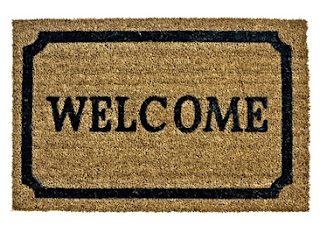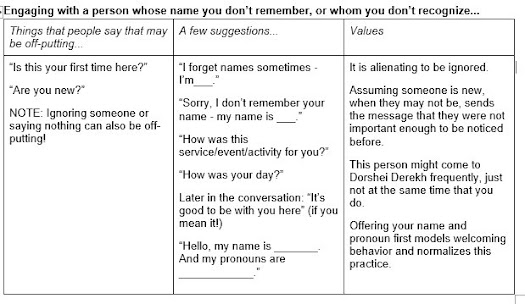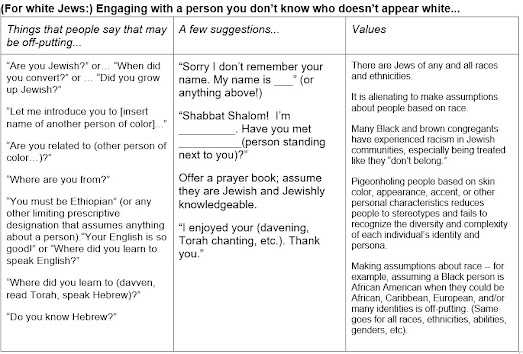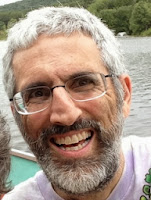Haknassat Orchim (Welcoming Guests): Creating a Welcoming Community at Minyan Dorshei Derekh
An introductory message from the Dorshei Derekh Antiracism Task Force, November 2021
All of us like to present our best selves to others.
We like to strengthen relationships with people we know and create new ones
with those we meet. Chances are, we usually succeed. But sometimes, despite our
good intentions, we all miss the mark; sometimes our words and behaviors have
consequences we do not intend. That is especially so as we seek to embrace the
full diversity within the Jewish community and reckon with the pernicious
racism that’s been a part of American, and thus also American Jewish, culture
and law for 400 years. The willingness of marginalized communities and
individuals to expect recognition of what they have often dealt with in silence
has created exciting possibilities as well as a level of discomfort among those
who, often unconsciously, have grown accustomed to being at the top of the
social ladder and in power.
Following important presentations as part of the
December 2019 Presser Shabbat programming on dynamics of racism within our own
minyan (which
itself followed up on previous looks at racial implications of Mass Incarceration, Climate
Justice, Immigration, and Education), Dorshei Derekh embarked on a concerted process to
become an antiracist minyan. Many quickly realized that becoming more welcoming
would require a careful look at our communal practices and our individual
behaviors.
We created the Dorshei Derekh Antiracism Task Force,
which set up reading groups to explore racism and early in 2021 shared a draft
welcoming document with our members. That draft document raised some important
questions and concerns. Some members felt overwhelmed by the sheer quantity of
phrases to use and not to use; they wondered how they could possibly remember
it all. Some found the tone accusatory. Several were worried that the list
could actually shut down, rather than encourage, conversation.
The primary goal of the Welcoming Guide--presented
here in a revised version--is to raise awareness about the often unintentional
impact of statements we make to others, create accountability, and offer
guidance to folks who may be struggling for the right words. No one is perfect;
try as we might, we make mistakes. We cannot easily erase phrases from our
minds and memorize others. We can hope, however, that these guidelines can, as
they become second nature over time, help us prevent unintended insults and
make us more welcoming.
Secondarily, we hope that the very existence of this
document will reassure Jews of Color, Sephardic Jews, differently-abled Jews,
Jews by Choice, queer and gender-expansive Jews, non-Jews -- all who join us,
whether once or permanently -- that we truly want to welcome each other with
open hearts and minds, fulfill the mitzvot
of haknassat orchim (welcoming
guests) and kavod habriot (honoring
all of God’s creation), and build what Martin Luther King, Jr., called “Beloved Community.”
We suggest that you peruse this document, set it aside, then reread it a few more times. If you deem some of the suggestions here unhelpful, don’t use them, or substitute what makes sense to you. And don’t forget: we all make mistakes, and we all know how to forgive.
We acknowledge with much appreciation
the organizations whose welcoming guides served as models for ours: Friends
General Conference, Unitarian Universalist Association, and Congregation Kol
Tzedek.
-- Dorshei Derekh Antiracism Task Force: Tamara Cohen, Andrea Jacobs, Beth Janus, Malkah Binah Klein, David Mosenkis, Jennifer Paget, Dina Pinsky, Atenea Rosado, George Stern, Elyse Wechterman. November 2021
Here are our suggestions for ways to reach out, introduce yourself, and
show interest -- all while respecting boundaries.
Engaging with a person whose name you don’t remember, or whom you don’t recognize...
ALWAYS REMEMBER: Don’t be afraid to reach out, introduce yourself, and show interest. It’s the only way to be welcoming!







